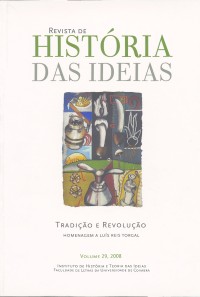Please use this identifier to cite or link to this item:
https://hdl.handle.net/10316.2/41586| DC Field | Value | Language |
|---|---|---|
| dc.contributor.author | Nunes, Maria de Fátima | - |
| dc.date.accessioned | 2017-05-03T22:31:16Z | |
| dc.date.accessioned | 2020-09-30T11:25:55Z | - |
| dc.date.available | 2017-05-03T22:31:16Z | |
| dc.date.available | 2020-09-30T11:25:55Z | - |
| dc.date.issued | 2008 | - |
| dc.identifier.issn | 0870-0958 | - |
| dc.identifier.issn | 2183-8925 (digital) | - |
| dc.identifier.uri | https://hdl.handle.net/10316.2/41586 | - |
| dc.description.abstract | Rómulo de Carvalho como um historiador da ciência insere-se na duplicidade da "tradição e da inovação" da escrita da História em Portugal no século XX. Em Coimbra usufrui da sociabilidade urbana e académica que a Universidade proporciona a agentes culturais da década de quarenta, associada à memória instrumental científica do Gabinete de Física do tempo pombalino. Traços de permanência temática ao longo do seu labor de historiador, resgatando os temas de cultura científica para demonstrar a capacidade de pensar a cultura e a ciência numa matriz de Portugal e a cultura europeia. O encontro de trabalho poético com um grupo de historiadores activos verificou-se no Liceu Normal Pedro Nunes, em Lisboa, através da organização e da concretização do Dicionário de História de Portugal, coordenado na década de sessenta por Joel Serrão. As "entradas" de Rómulo de Carvalho (RC) demonstram a sua efervescência intelectual aplicada à modernidade do século XVIII e XIX. | por |
| dc.description.abstract | The historian of science Rómulo de Carvalho is part of both "tradition and innovation" in History writing in twentieth-century Portugal. In Coimbra he enjoyed the urban and academic socialisation that the University provided to cultural agents of the forties, associated to the scientific instrumental legacy of the Physics Department of the Pombaline period. The recurring scientific themes found throughout his work as a historian show his ability to think of culture and science within the matrix of Portugal and Europe. The development of his poetic work with a group of active historians occurred at the Pedro Nunes Secondary School, in Lisbon, through the organisation and production of the Dicionário de História de Portugal, coordinated in the sixties by Joel Serrão. Rómulo de Carvalho's "entries" (RC) show his intellectual effervescence applied to the modern period of the eighteenth and nineteenth centuries. | eng |
| dc.language.iso | por | - |
| dc.publisher | Imprensa da Universidade de Coimbra | - |
| dc.rights | open access | - |
| dc.title | Rómulo de Carvalho: um historiador da ciência, percursos e poética | por |
| dc.title.alternative | Rómulo de Carvalho: a historian of science, routes and poetics | por |
| dc.type | article | - |
| uc.publication.collection | Revista de História das Ideias vol. 29 | - |
| uc.publication.firstPage | 703 | - |
| uc.publication.lastPage | 714 | - |
| uc.publication.location | Coimbra | - |
| uc.publication.journalTitle | Revista de História das Ideias | - |
| uc.publication.volume | 29 | por |
| dc.identifier.doi | 10.14195/2183-8925_29_27 | - |
| uc.publication.orderno | 28 | - |
| uc.publication.area | Artes e Humanidades | - |
| uc.publication.manifest | https://dl.uc.pt/json/iiif/10316.2/41586/248229/manifest?manifest=/json/iiif/10316.2/41586/248229/manifest | - |
| uc.publication.thumbnail | https://dl.uc.pt/retrieve/11856577 | - |
| item.grantfulltext | open | - |
| item.fulltext | With Fulltext | - |
| Appears in Collections: | Revista de História das Ideias | |
Files in This Item:
| File | Description | Size | Format | |
|---|---|---|---|---|
| romulo_de_carvalho.pdf | 8.8 MB | Adobe PDF |  |
Items in DSpace are protected by copyright, with all rights reserved, unless otherwise indicated.
